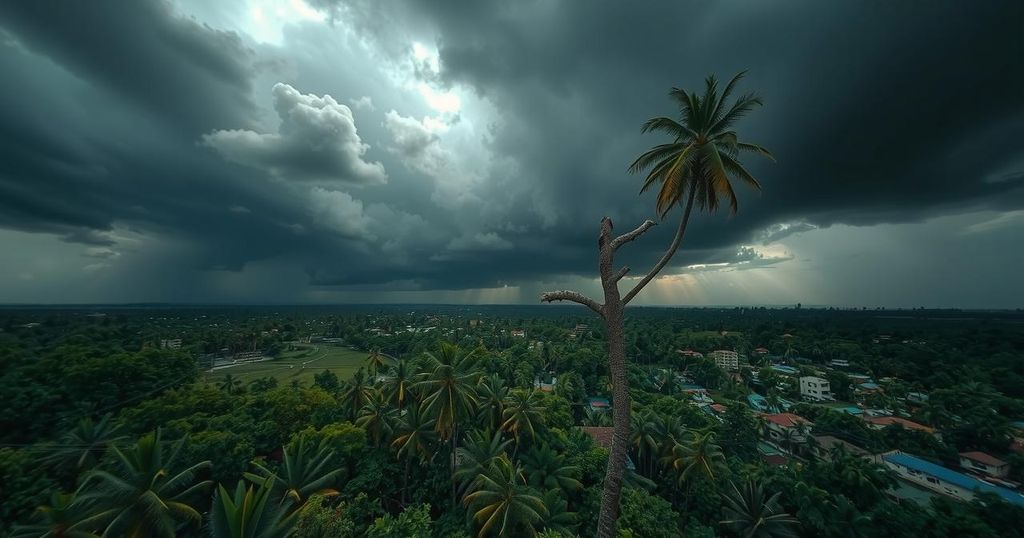Cuban Power Crisis Intensifies as Hurricane Oscar Approaches
Cuba faces a third consecutive day without power as efforts to restore electricity falter. Hurricane Oscar is expected to exacerbate the crisis, affecting the nation’s already weakened energy infrastructure. Reports indicate public unrest due to power outages and fundamental supply shortages. The government attributes the crisis to a mix of U.S. sanctions, infrastructural decay, and natural disasters. Health services are continuing through generator use, but dissatisfaction is rising among the populace regarding support from international allies.
Millions of Cubans are facing a third consecutive day without electricity as efforts to restore power have continuously failed. According to the Cuban Electrical Union, approximately 16% of the national grid regained functionality, yet an overload occurred late Saturday, resulting in another blackout. This situation marks the third total collapse of the nation’s aging energy grid since the crisis commenced on Friday when a significant power plant experienced a failure. Most of the population of 10 million has endured intermittent power outages throughout this period. The situation has been exacerbated by the forecasted arrival of Hurricane Oscar, which is anticipated to make landfall on Cuba’s northeastern coast after already impacting Inagua Island in The Bahamas with wind speeds reaching 80 mph. Though some weakening of the storm is expected post-landfall, it is projected to maintain tropical storm status as it moves across Cuba and into the central Bahamas. With the recent blackouts, the already faltering infrastructure could face a more severe crisis, further impacting essential services such as water supply and food preservation. In Havana, residents have resorted to using social media platforms to communicate about areas that still have power. The lines for basic necessities such as bread have been lengthy, with reports of heightened tensions among citizens as supplies dwindle. The current predicament has led to increased scrutiny regarding Cuba’s alliances; individuals have expressed concerns about the lack of support from traditional allies such as Venezuela, Russia, and Mexico, who have historically provided necessary oil supplies to maintain energy production. Tourists continue to navigate Havana, but many hotels have reported outages and a shortage of fuel for their generators. Moreover, the international airport is functioning under limited emergency power, significantly hampering operations. Reports of protests have emerged across the capital, reflecting growing dissatisfaction with the current energy crisis. Cuban officials attribute these issues to a myriad of factors, including U.S. economic sanctions and recent weather-related disruptions affecting the power infrastructure. In a recent televised address, Prime Minister Manuel Marrero Cruz remarked that the government has had to halt significant economic activities to conserve energy for the populace. Meanwhile, Health Minister José Angel Portal Miranda confirmed that health services are being maintained through generator use, underscoring the crisis’s impact on public services. This evolving situation in Cuba highlights the confluence of historical vulnerabilities within its energy infrastructure, the pressures of external sanctions, and the immediate challenges posed by Hurricane Oscar, enhancing the urgency of restoration efforts.
Cuba’s energy infrastructure is characterized by age and underfunding, leading to recurrent failures. The nation has endured a series of nationwide blackouts which have drawn significant public attention and dissatisfaction. As a country heavily reliant on imports for energy, recent economic sanctions have compounded existing issues, and natural disasters—like hurricanes—pose additional threats. The hurricanes not only disrupt supply lines but also damage the fragile infrastructure, leading to extended outages that affect daily life and public health. Cuba’s reliance on traditional allies for fuel and support highlights the vulnerabilities within its geopolitical relations and the pressing need for energy resiliency. Hurricane Oscar, recently categorized as a hurricane, adds an unpredictable factor in an already tense situation, requiring immediate responses to mitigate risks to the population, especially in the wake of systemic energy failures. The convergence of these challenges necessitates urgent attention from both the local government and international community to stabilize the situation.
In summary, Cuba is grappling with an energy crisis that has left millions without power for several days, compounded by the impending threat of Hurricane Oscar. The systemic failures of the energy grid, coupled with economic sanctions and infrastructure deterioration, have led to significant unrest among the population. Essential services, including healthcare, are being impacted, and there is a notable lack of support from traditional allies. The Cuban government faces the dual challenge of recovering from the current situation while preparing for further complications brought on by the hurricane.
Original Source: www.cnn.com




Post Comment